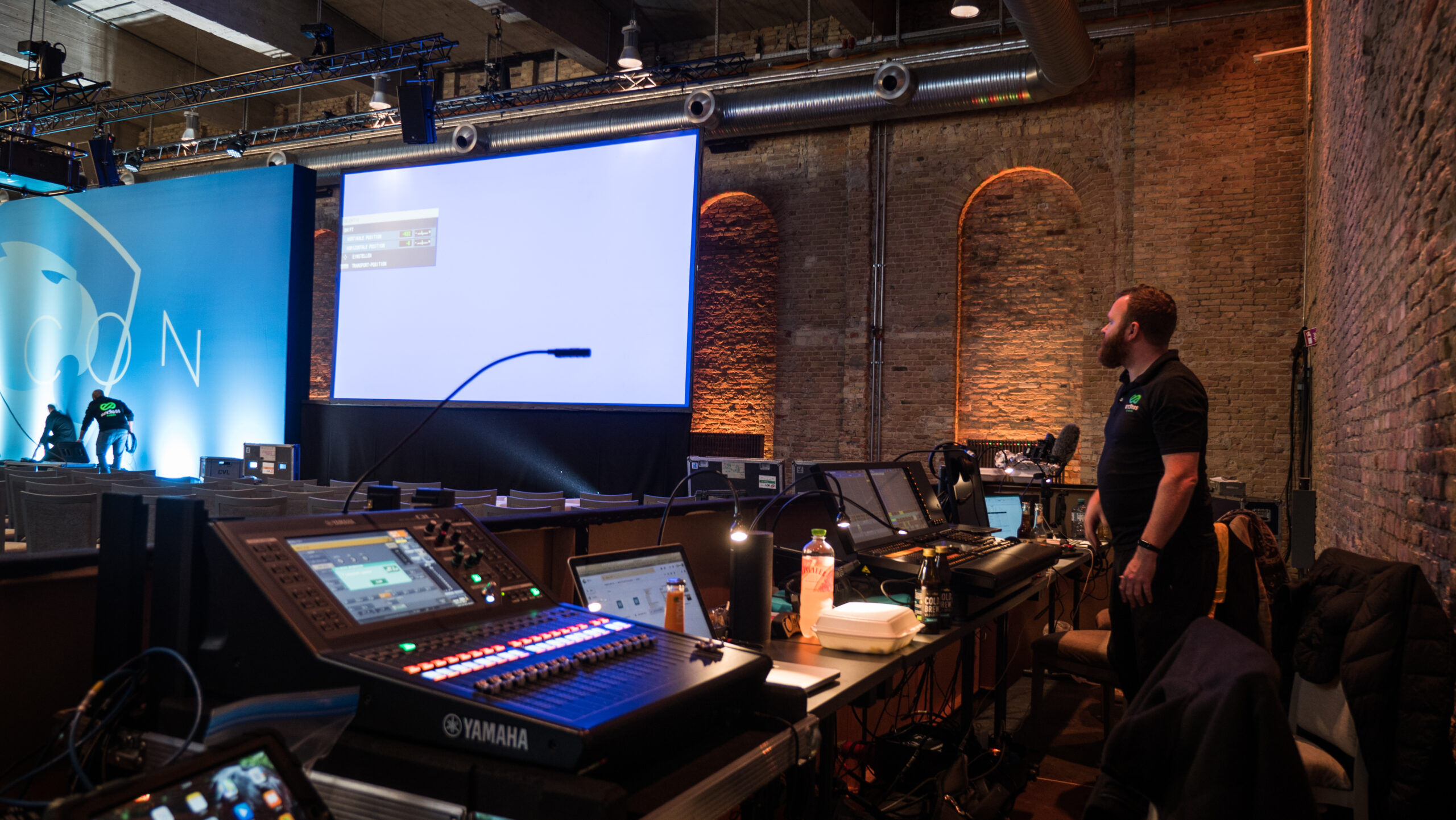How Event Production Functions: A Comprehensive Take A Look At the Refine
Event production is a complex and organized procedure that needs careful planning and execution. It begins with developing clear purposes and comprehending the target market. Each action, from budgeting to place selection, plays a critical function in guaranteeing success. As the procedure unfolds, numerous elements have to line up flawlessly. The subtleties of this complex operation frequently go unnoticed. What are the key stages that contribute to an unforgettable event?

The Preliminary Drawing Board
When starting on event production, careful preparation is important to guarantee an effective result. The first drawing board functions as the foundation for all subsequent initiatives. During this phase, event manufacturers need to define the event's objective and objectives plainly. Identifying the target audience aids customize the experience and messaging, ensuring importance and engagement.Producers have to additionally take into consideration the event layout, whether it be in-person, digital, or hybrid, as this will certainly affect numerous logistical elements. Picking a suitable day and location is vital, as it affects availability and availability.Furthermore, constructing a reliable group is basic for splitting duties and simplifying communication. Establishing a timeline with milestones warranties all tasks are completed on time. This stage includes thorough research study, including identifying possible challenges and creating approaches to alleviate dangers. Eventually, a well-structured preliminary preparation stage establishes the tone for an effective event production trip.

Budgeting and Source Appropriation
In event production, reliable budgeting and resource allocation are important for success - event production charlotte. Developing monetary criteria sets the foundation for all succeeding decisions, while resource circulation strategies ensure that every part of the event is adequately sustained. With each other, these aspects assist preserve control over expenses and optimize the use of offered resources
Developing Financial Parameters
Developing financial parameters is important to the success of any kind of event production, as it sets the foundation for effective budgeting and resource allowance. This process starts with defining the general spending plan, which includes all facets of the event, including venue prices, event catering, and advertising. By recognizing available funds, event coordinators can focus on expenses and assign resources accordingly. In addition, it is necessary to carry out complete marketing research to expect prospective expenses and determine funding sources, such as sponsorships or ticket sales. Developing clear economic specifications additionally aids in danger management, permitting planners to establish aside contingency funds for unexpected costs. Eventually, a distinct spending plan functions as a roadmap, leading the event production group towards achieving their objectives while maintaining monetary control.
Source Distribution Techniques
Reliable source distribution techniques are essential for making the most of the influence of an event while adhering to spending plan restrictions. Effective event production needs a thorough technique to budgeting and source allowance. Planners have to focus on essential components such as location, event catering, and modern technology, guaranteeing that funds are assigned to locations that improve guest experience. A detailed spending plan ought to detail anticipated costs and recognize areas for possible cost savings, such as working out with suppliers or discovering sponsorship possibilities. In addition, tracking expenditures throughout the planning process aids prevent overspending. By utilizing critical source circulation, event manufacturers can deliver a remarkable experience while keeping financial responsibility, eventually adding to the total success of the event.
Location Choice and Logistics
Picking the right venue is necessary to the success of any type of event, as it sets the phase for the general experience. Location option includes reviewing different elements, including ability, availability, and area. Organizers should take into consideration the target market and the nature of the event, making sure the location lines up with the event's goals.Logistics play a considerable role in this procedure, involving arrangements for seats, audiovisual devices, and catering solutions. An appropriate location needs to promote smooth flow for participants and team, improving engagement.Additionally, evaluating prospective venues for facilities like vehicle parking, washrooms, and fire escape is essential for security and comfort. The timeline for safeguarding the place is additionally critical, as prominent places might schedule promptly - event production charlotte. Thorough preparation and prompt execution can ultimately contribute to a smooth event experience, making venue option and logistics basic elements of effective event production.
Imaginative Principle Advancement
While the location establishes the physical phase, innovative principle development forms the event's identity and narrative. This process starts with recognizing the event's purpose and target market, permitting event producers to create a compelling style that reverberates with guests. Brainstorming sessions often include varied viewpoints, fostering cutting-edge concepts that line up with the event's goals.Once a theme is developed, visual components such as color palettes, signage, and decor are created to improve the total atmosphere. Storytelling methods might likewise be integrated to produce an interesting trip for individuals, guaranteeing a remarkable experience. In addition, factors to consider pertaining to amusement, activities, and interactive elements are straightened with the picked concept, strengthening the motif throughout the event.Ultimately, effective creative concept growth warranties that every facet of the event functions cohesively, leaving a long lasting impact on attendees and satisfying the event's purposes. This fundamental job lays the foundation for subsequent planning and execution stages.
Teaming up With Vendors and Suppliers
Successful event production depends upon effective collaboration with vendors and vendors. Choosing dependable partners, negotiating agreements successfully, and guaranteeing timely deliveries are vital action in this procedure. Each of these elements adds considerably to the general success and smooth execution of an event.
Selecting Reliable Partners
Exactly how can event organizers assure a smooth production experience? Picking reliable partners is vital in attaining this objective. Event planners must carry out complete research study to recognize vendors and distributors with a tested record of excellence. This consists of inspecting references, reviewing portfolios, and evaluating client comments. Planners ought to prioritize companions that show professionalism and reliability, timely communication, and a desire to team up. Structure solid partnerships fosters trust fund and allows fast problem-solving throughout the event. Furthermore, it is useful to select neighborhood suppliers who comprehend the place and regional logistics. Inevitably, an effective event rests on the synergy in between coordinators and their partners, making sure that every aspect of production runs efficiently and efficiently.
Working Out Contracts Properly
Effective settlement of contracts is an important action in the collaboration between event organizers and their vendors and distributors. This process includes clear interaction of assumptions, deliverables, and timelines. Organizers must perform thorough study on market prices and sector criteria to establish a baseline for arrangements. It is vital to produce a collaborative environment, motivating open discussion about terms, pricing, and possible backups. Organizers should also focus on understanding the vendor's capacities and limitations to align their needs useful link properly. Adaptability can bring about mutually valuable agreements, cultivating long-term connections. Crafting well-defined contracts that include specific efficiency metrics can aid assure responsibility, ultimately causing effective event execution and complete satisfaction for all celebrations entailed.
Making Certain Timely Distributions
Prompt distributions are important for the smooth execution of any event, needing attentive collaboration in between planners and their vendors and distributors. Effective communication is important, as it helps establish clear assumptions relating to distribution schedules, quantities, and details demands. Organizers frequently develop detailed timelines to lay out important landmarks, making certain all events continue to be aligned throughout the process. Regular check-ins with suppliers can assist identify possible hold-ups early, permitting positive services. In addition, constructing solid relationships with trustworthy suppliers fosters trust and accountability, which can lead to much better solution and prioritization. By focusing on these collective efforts, coordinators can minimize disturbances, thereby improving the total efficiency of event production and making sure that all needed products and services show up as planned.
Advertising and Promotion Techniques
While organizing an event, the success of marketing and promotion approaches can considerably affect attendance and involvement. Effective strategies usually include a combination of electronic advertising, typical advertising, and grassroots outreach. Using social networks platforms permits real-time communication and targeted advertising and marketing, getting to particular demographics successfully. Email marketing campaigns can even more engage possible guests with customized web content and reminders.Collaborations with influencers or market leaders can also boost reputation and expand reach. Producing engaging material, such as videos or blogs, aids to create buzz and receive rate of interest leading up to the event. In addition, leveraging early-bird discounts and unique advantages can incentivize ticket purchases.Promoting through standard channels, such as posters or regional media, continues to be pertinent, particularly in community-focused events. A thorough method that integrates numerous approaches assurances optimum presence and engagement, ultimately contributing to the event's success and the production of an unforgettable experience for participants.
On-Site Implementation and Administration
On-site implementation and management are essential elements that identify the total success of an event. Reliable sychronisation during the event assures that all elements line up with the planned agenda. Event supervisors manage logistics, including supplier coordination, tools arrangement, and guest solutions. Keeping an eye on timelines and dealing with any kind of unexpected issues are essential for keeping a seamless experience.The team plays a considerable role, as experienced personnel are accountable for various tasks such as enrollment, info dissemination, and technological support. Communication amongst staff member is critical; it promotes a collective environment and makes it possible for fast resolution of challenges.Additionally, safety methods have to be complied with, guarding the wellness of all participants. Post-event assessments are additionally part of on-site monitoring, supplying insights for future renovations. By concentrating on these elements, event manufacturers can create remarkable experiences that fulfill or go beyond guest expectations while accomplishing the event's objectives.
Frequently Asked Concerns
Just how Do I Choose the Right Event Style?
Picking the ideal event motif involves considering the target audience, event objective, and Discover More Here venue. Investigating current fads and gathering input from stakeholders can also motivate imaginative concepts that resonate and create a memorable experience.

What Prevail Errors in Event Production?
Usual errors in event production typically include poor planning, bad communication amongst group members, budget mismanagement, ignoring to consider the audience's demands, and falling short to perform a complete post-event evaluation for future renovations.
Exactly How Can I Gauge Event Success?
To measure event success, one can examine participant satisfaction, engagement degrees, budget adherence, and post-event feedback. Key efficiency indicators, such as ticket sales and social media sites communications, additionally offer beneficial Visit This Link insights right into general efficiency.
What Should I Do if It Moistens the Event Day?
In the event of rain on the day, the organizer ought to carry out contingency plans, such as protecting camping tents or moving activities inside. Communication with guests regarding modifications is important to assure a smooth experience in spite of weather challenges.
Exactly How Can I Guarantee Attendee Involvement During the Event?
